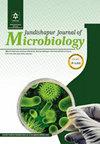伊朗阿瓦兹第三新生儿重症监护室感染碳青霉烯耐药革兰氏阴性菌的新生儿败血症的频率、细菌学特征和结果
IF 0.5
4区 医学
Q4 MICROBIOLOGY
引用次数: 0
摘要
背景:低收入和中等收入国家(LMICs)新生儿死亡的主要原因之一是由碳青霉烯耐药革兰氏阴性菌引起的新生儿败血症。目的:本研究旨在确定伊朗西南部新生儿碳青霉烯耐药革兰氏阴性败血症的频率、细菌谱和结局。方法:在一家三级转诊培训医院进行为期15个月的回顾性横断面描述性研究。该研究包括所有从出生起就住院的革兰氏阴性菌血培养阳性的新生儿。患者分为碳青霉烯耐药组和碳青霉烯敏感组。结果:在研究过程中,从113例新生儿血液培养中分离到革兰氏阴性菌。革兰氏阴性菌血培养阳性和碳青霉烯耐药病例分别为2.38%和1.52%。在这些病例中,66例(58.4%)为男婴,100例(88.4%)为早产儿,74例(65.4%)在出生后三天内需要机械通气。该研究发现45例(39.8%)婴儿患有早发性败血症。不动杆菌是最常见的分离菌,肠杆菌的分离率最低。72例(63.7%)血培养阳性发现碳青霉烯类耐药。碳青霉烯耐药率最高的是不动杆菌,最低的是假单胞菌。碳青霉烯耐药菌(CRB)感染的婴儿死亡率为89.3%,而碳青霉烯敏感菌(CSB)感染的婴儿死亡率为10.7%。结论:我们病房碳青霉烯耐药革兰氏阴性脓毒症的发生率为1.52%,不动杆菌是这类新生儿脓毒症的最常见原因。感染CRB的婴儿死亡率高于感染CSB的婴儿,分别为89.3%和10.7%。本文章由计算机程序翻译,如有差异,请以英文原文为准。
Frequency, Bacteriological Profile, and Outcome of Neonatal Sepsis with Carbapenem-Resistant Gram-Negative Bacteria at the Tertiary Neonatal Intensive Care Unit, Ahvaz, Iran
Background: One of the leading causes of neonatal mortality in low- and middle-income countries (LMICs) is neonatal sepsis caused by carbapenem-resistant gram-negative bacteria. Objectives: This study aimed to determine the frequency, bacterial profile, and outcome of carbapenem-resistant Gram-negative neonatal sepsis in southwest Iran. Methods: This 15-month retrospective cross-sectional descriptive study was conducted at a level 3 referral training hospital. The study included all neonates hospitalized from birth who had positive blood cultures for Gram-negative bacteria. Patients were divided into carbapenem-resistant and carbapenem-sensitive groups. Results: During the study, Gram-negative bacteria were isolated from the blood cultures of 113 neonates. Positive Gram-negative bacteria blood cultures and carbapenem-resistant cases were 2.38% and 1.52%, respectively. In these cases, 66 (58.4%) of the infants were males, 100 (88.4%) were preterm, and 74 (65.4%) required mechanical ventilation within the first three days of life. The study found 45 (39.8%) infants with early-onset sepsis. Acinetobacter was the most common isolated organism, while Enterobacter had the lowest isolation rate. Carbapenem resistance was discovered in 72 (63.7%) positive blood cultures. Acinetobacter had the highest prevalence of carbapenem resistance, while Pseudomonas had the lowest. Mortality rates in infants infected with carbapenem resistance bacteria (CRB) were 89.3% compared to 10.7% in those infected with carbapenem-sensitive bacteria (CSB). Conclusions: The frequency of carbapenem-resistant Gram-negative sepsis in our ward was 1.52 percent of all admissions, and Acinetobacter bacteria was the most common cause of this type of neonatal sepsis. Infants infected with CRB had a higher mortality rate than those infected with CSB, 89.3% versus 10.7%.
求助全文
通过发布文献求助,成功后即可免费获取论文全文。
去求助
来源期刊

Jundishapur Journal of Microbiology
MICROBIOLOGY-
CiteScore
1.30
自引率
0.00%
发文量
56
审稿时长
6-12 weeks
期刊介绍:
Jundishapur Journal of Microbiology, (JJM) is the official scientific Monthly publication of Ahvaz Jundishapur University of Medical Sciences. JJM is dedicated to the publication of manuscripts on topics concerning all aspects of microbiology. The topics include medical, veterinary and environmental microbiology, molecular investigations and infectious diseases. Aspects of immunology and epidemiology of infectious diseases are also considered.
 求助内容:
求助内容: 应助结果提醒方式:
应助结果提醒方式:


